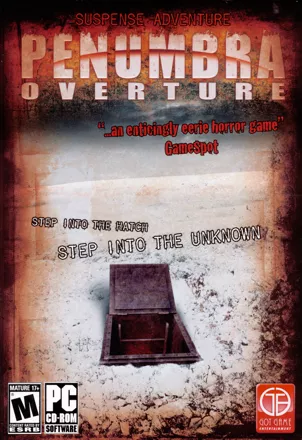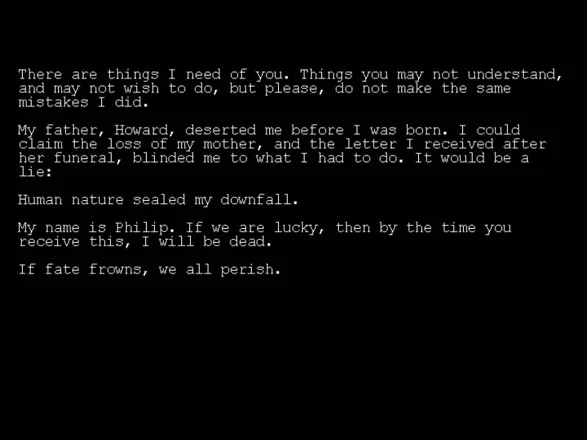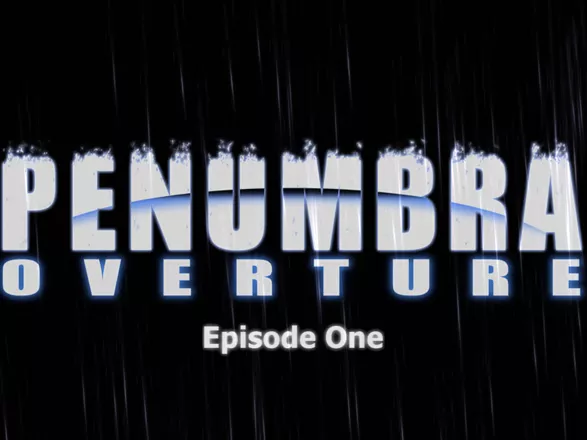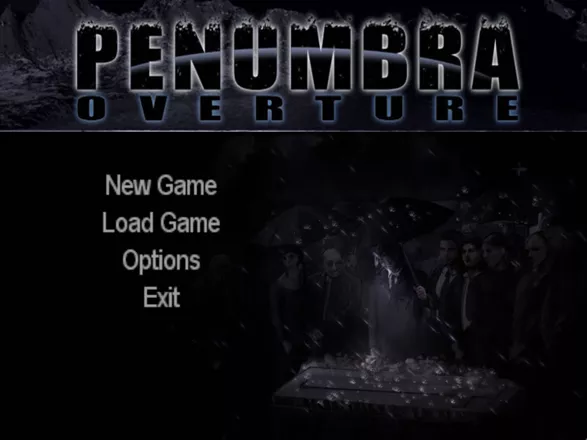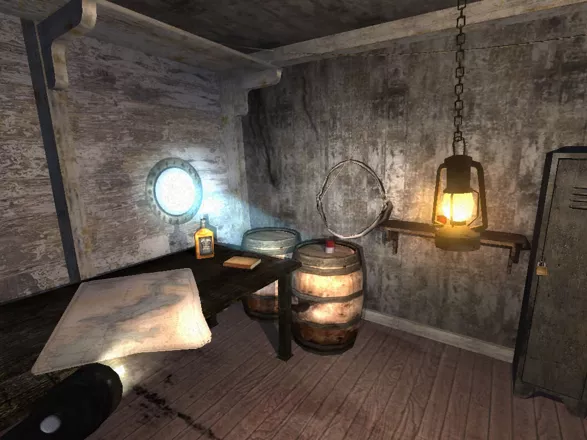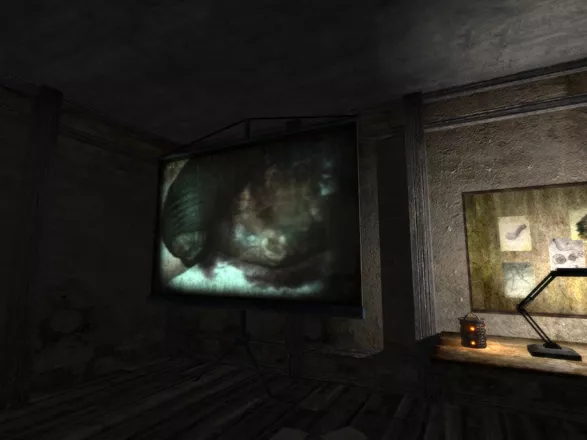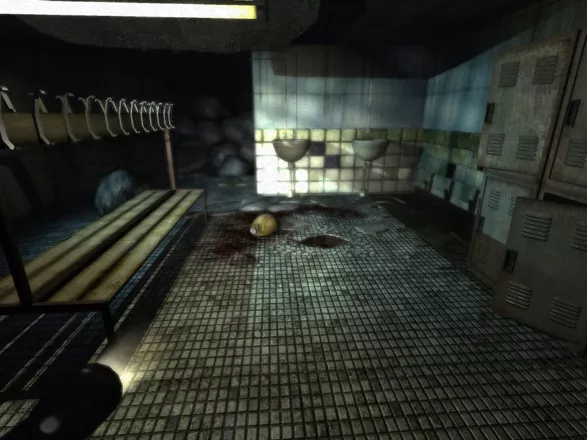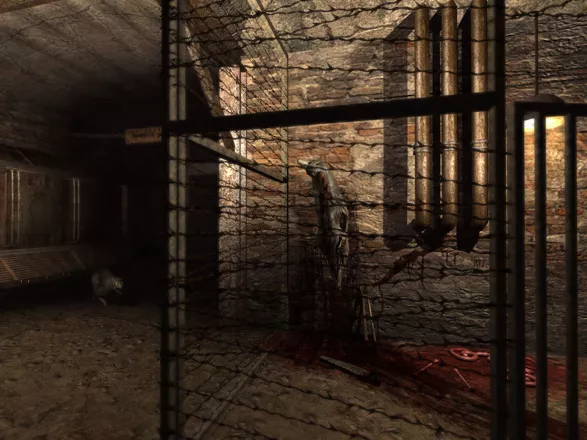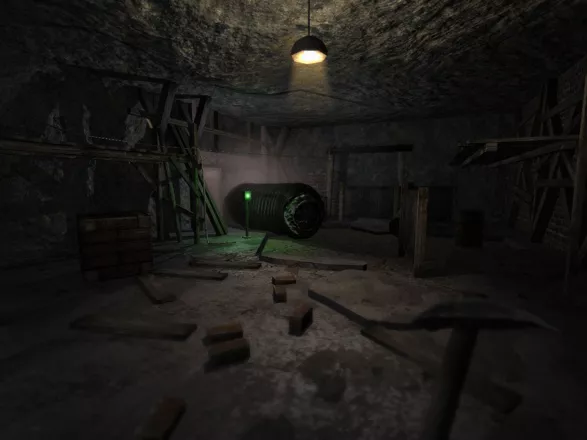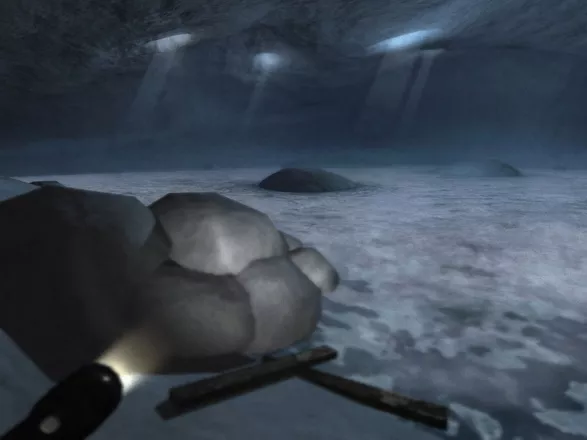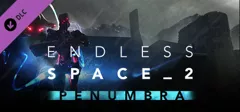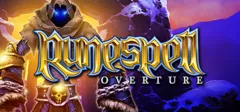Penumbra: Overture - Episode 1
Description official descriptions
Penumbra: Overture is a first-person survival horror game. Originally created as a tech demo to showcase the in-house developed HPL engine, the small team soon turned it into a full game, split up into two episodes (originally advertised as three), of which this is the first one.
Players take on the role of Philip. After his mother's death, he receives a letter of his father, a man he has never seen in his life and presumed dead. Philip is asked to destroy a set of notes, but instead he decides to travel to the wastelands of Greenland following the clues left in the writings. He ends up in an underground complex where he discovers disturbing facts about the past and events hidden from the rest of the world.
Unlike other survival horror games, Penumbra heavily focuses on adventure elements with physics-based and inventory-based puzzles, exploration, and a few action elements and scripted sequences, with a first-person perspective and mechanics similar to a first-person shooter. Players need to use the environment to operate items and machines, and build structures with items scattered around. Almost any item can be picked up and used as an active game element. Actions need to be performed through an appropriate motion with the mouse: hold and move left or right to swing a weapon, turn valves in a circular motion, pull back to open drawers and doors, etc.
Key items are stored in an inventory and need to be combined or used with objects to progress in the game. Clues and background information about the events are gathered through notes left behind and one-way conversations with a mysterious man called Red. Puzzles often require a lot of thinking, with both visual and auditive elements, and need thorough investigation of the environment. All notes are stored in a notebook and clues for puzzles and tasks are added a to do list.
Philip can collect weapons such as a hammer, a broom and a pick axe, but melee fighting is generally discouraged and rarely rewarded. Instead, players need to use the environment to set up inventive traps or avoid fighting altogether by using distractions or stealth to sneak past enemies. By hiding in the shadows, the edge of the screen turns blue and Philip stays hidden for all creatures. The environment is almost completely dark at all times, enhancing the horror experience. Light sources are very important, and Philip only has a flashlight with a limited amount of batteries, a glowstick and flares.
Next to a constant feeling of desolation, there are many disturbing events and horrifying elements, so the faint of heart need not apply. The game supports OpenAL sound.
Spellings
- Пенумбра 1. Истоки зла - Russian spelling (1C Company release)
- Пенумбра: Темный мир - Russian spelling
Groups +
Screenshots
Promos
Credits (Windows version)
39 People (34 developers, 5 thanks) · View all
| Lead Programming | |
| Additional Programming | |
| Lead Graphics | |
| Additional Graphics | |
| Sound | |
| Music | |
| Level Scripting | |
| Written by | |
| Voice Talent | |
| Logotypes | |
| Special Thanks to |
|
| Beta Testing | |
| President | |
| V.P. Product Development | |
| V.P. Systems | |
| [ full credits ] | |
Reviews
Critics
Average score: 74% (based on 53 ratings)
Players
Average score: 3.9 out of 5 (based on 57 ratings with 4 reviews)
The Good
There was a lot going on in this game that the horror genre and adventure genre have needed for a long time.
First off this game gave the adventure genre of games the much needed face lift it has so long deserved. By using a first person perspective and a unique control scheme Penumbra succeeds where games like Clocktower and Resident Evil failed by reworking the genre to include action that you can not find in your typical scripted adventure game without either making the games controls difficult or jumping genres.
Second the game succeeds in creating an actual horror atmosphere by limiting you in such a way that you cannot simply run in with guns blazing, because lets face it, it's just not scary when you can shoot the monster in the face with a rocket launcher. The feeling of being isolated and trapped also played a huge factor in the atmosphere, because there were many times I wondered the claustrophobia inducing corridors of the mine with complete paranoia at what might be awaiting me around the next corner.
The Bad
Penumbra failed to deliver. There simply was not enough diversity in the monsters and after a while spiders and dogs are just annoying rather than scary. Also I feel they might have went a bit to overboard with the lack of combat, because I found it next to impossible to kill anything at all. If it's going to be that hard why have weapons at all?
The Bottom Line
Penumbra had a lot of potential to be better than it was and I would recommend playing it for fans of the horror genre who need a quick fix, but not for those looking for a truly spectacular horror game.
Windows · by Geo_Seven (11) · 2008
The most unusual adventure of recent time, but is it enough?
The Good
Finally after long years of waiting the adventure genre had moved forward. The year 2006 showed a lot of innovation together with a rediscovery of a hilarious narrative of a comedy adventure in form of such games as Fahrenheit, Scratches, Dreamfall, Sam & Max Season One, Al Emmo, Scratches and so on. The trend of innovation continues in 2007 by the will of Frictional Games, an independent developer together with their horror-adventure game Penumbra: Overture – Episode 1. With a powerful physics engine and a complete real-time 3D environment Frictional Games has managed to succeed where it seems that everybody else failed, in creating a constant suspense atmosphere that can’t be ruined by either illogical puzzles (as in other horror adventures) or by over-reliance on cheap effects (as in other horror actions). But unfortunately for the Penumbra, all that glitters isn’t always gold. Check out the not so Good section for details.
Of course the main driving force behind the title is physics. The game that has a library file called “Newton.dll” in its folder convincingly proves that harnessing the computing power of a gamer’s CPU may yield not only spectacular results for an action gaming but provide a sophisticated and intelligent gameplay of an adventure as well. Much like in Fahrenheit the player has to perform a certain pattern of movements with his mouse to do simple actions which in any another game may be accomplished by simply pushing a button. However unlike Fahrenheit, Penumbra applies all the known laws of Newtonian (all three of them) physics to these actions. So opening a door will be a much easier enterprise, if you get hold of it as far away from the hinges as you can. Otherwise expect a lot of effort to be put in moving your USB rodent. The same goes for turning valves, pulling levers, opening drawers, moving barrels, throwing motors and so on. With Penumbra all these everyday actions (at least for a gamer’s life) are performed with a fresh and interesting approach.
Thank God Frictional Games has not applied the same system to the combat part as well. Although it still has certain issues, the action in Penumbra is a far cry of that unyielding monstrosity as seen in Trespasser. Thank God, because the action takes a bigger role in the gameplay of Penumbra, as one might expect. Fighting off zombie dogs could be a much more a nuisance than it is in its current state. But still, although I always support the inclusion of action sequences in my adventures I would recommend you to set the difficulty level to easy at the beginning of the game. You won’t lose any bit of a challenge, because the main challenge of Penumbra lies in its puzzles, but will save yourself a lot of unnecessary encounters with the game’s awkward combat system.
In terms of story and presentation the game is a devoted follower of System Shock. The masterpiece by Looking Glass studios and Irrational games is constant source of inspiration for the developers. Penumbra features the same nonstop gameplay in which all the plot twists are revealed not in separate cutscenes, but during the game itself (Yes, you zealous Half-Life fans, System Shock did it first!). You will constantly find the notes of the previous (and a few current) inhabitants of the underground complex you’re exploring, much like in fashion of audio logs as seen in original System Shock. Even the greatest villain of all time, Shodan, has got her respective counterpart in the first episode of Penumbra. A delusional yet mysterious and obviously intelligent person Red will guide you, in his own cryptic way, through the obstacles, you will be constantly encountering. Expect some serious and convincing voice-acting on his part. Unfortunately all the other parts of its inspirational source Penumbra got wrong. Which brings me to the…
The Bad
So what’s wrong with this game? First of all it is level design. The guys from Frictional Games obviously put a lot of effort in the locations that require a lot of exploring on players part. But what about all the others? Running through the constant featureless corridors can hardly be a worthwhile time spending for a seasoned adventurer. Now System Shock did that right. All the corridors and rooms connected represented a unified whole. In Penumbra you almost feel that those aspects of level design were created by different people. Tell me why do we have to suffer through these tedious, long and tiresome corridors every time we want to get somewhere? It seems that Frictional Games has a lot to work upon until the release of the second episode.
Another miss is all those notes scattered throughout the game. The problem with them is that they’re so unrelated to the game and to each other that considering their size it hardly worth the bother to read them through. Again, System Shock got that right. In SS, and especially in SS2 all the logs were personal, intimate I might say. There were a countless number of subplots going on through these messages. Each new log was like a birthday present. You were always wondering what happened to this particular person and what he was going through. Penumbra does neither of that. Except a thrilling diary of a spider-eating madman, all that you have to read is dry news clippings, and workers’ log reports. Hardly an entertaining or intimate stuff if you ask me.
And the last and most serious of Penumbra crimes is that it doesn’t live up to its advertisement. All of the inventory based puzzles has nothing to do with physics whatsoever. Double-click on an item, click on the hotspot and here you are! No physics implied, classic adventure gaming in its purest form. All the physics go to opening the doors, pulling levers and pushing rocks. I really expected from Penumbra a much more serious level of interaction than just pulling, pushing and turning stuff.
The Bottom Line
So what do we have? Cool physics system, advanced graphics, thrilling atmosphere and excellent voice-acting against poor level design, limited interaction and overabundance of unrelated text. It’s truly a tough choice. But given a game indie status and that it’s an episodic title, I think we should give Frictional Games a chance to improve. If truth be told they’ve managed to deliver a decent and honest game. So I have to say that you support the game now, otherwise you’ll miss one of the most unique gaming experience on this (PC) shore of the gaming market and deny the most promising game series of recent time its right for existence. And it would be a real shame if you do so.
Windows · by St. Martyne (3648) · 2007
A major leap forward for adventure gaming and survival horror
The Good
Survival horror, mainly on consoles, usually takes the form of a third-person action game, with a few minor puzzles. Unless it is Alone in the Dark or Ecstatica, that concept does not work for me. The cinematic perspectives turn the player more into a director, rather than being the character, and the re-run of locations, the hordes of enemies, and the seemingly redundant puzzles reduce the initial excitement to dull gameplay, constantly reminding the player this is just a game with promised game time to live up to. Guns blazing, the survival element is soon lost and designers have to come up with enemies five time the character's size for a challenge.
"Dramatize, dramatise!" Henry James would shout. Indeed, the power of suspension lies in absence – showing, not telling. Penumbra: Overture achieves immersion through 4 major elements: a dark, isolated environment fully navigable through a first-person perspective with convincing graphics, realistic physics and challenging puzzles, very few and exceptionally strong enemies constantly leaving the player in fear, and finally, a strong storyline interwoven into the gameplay instead of shown through cut-scenes breaking the flow. To fully enjoy this game, you need to darken the room and turn the volume up, it is all about the atmosphere.
The player controls Philip, a young man who receives a letter from his father, whom he presumed dead. He asks him to destroy his notes, but Philip becomes intrigued, reads the notes, and travels to Greenland to find out what his father has been up to. After a short sequence aboard the ship, which acts a tutorial where the player experiments with the controls and physics, the game starts with a blast as Philip ends up in a snowstorm on a deserted wasteland, with only a few minutes left before he freezes to death. The adrenaline kicks in right away, as you search for a hiding spot in a blindingly furious storm, and when you finally find a safe haven, it turns out to be a worse place than outside.
The entire game takes place in a dark, underground complex. There are only a few light sources, and Philip has to rely on his flashlight (with depletable batteries), a glowing stick and flares. Darkness is not a shade of grey in this game, but truly a wall of pitch black. The game is largely spent exploring the areas and finding ways to proceed. It will take up to an hour into the game to meet the first enemy, but before that, you will have heard noises and screams, read notes about strange creatures, and seen bloody traces and remains.
Unlike Half-Life 2 that pushed the envelope of physics and interaction for the player, but ultimately turned it into a gimmick (let’s hurl some white paint at that zombie!), in Penumbra it becomes more than just a fun distraction. The manipulation of items is elementary to advance in the game. Many first-person shooters lose their sense of immersion by forcing down a level path through the player's throat, regardless of the environment. It is hardly believable a hero is able to bring down an alien as large as an apartment block if he cannot move a tiny crate to make way over a fence. For every action, Frictional has constantly considered how the physics can be involved: opening a drawer has the player move the mouse down, valves are closed with a circle-swing, items can be tossed in the air... it would be perfect for the Wii controls. But there is more to it, some puzzles have the player stack crates, planks and barrels forming a large structure to reach higher areas. Using this approach, there are multiple paths to solve puzzles, and the player is only limited by natural forces. Surprisingly, the puzzles strongly resemble those from classic point-and-click adventure games, with both environment and inventory-based actions. None of them feel illogical or thrown in to add to the game's length, and a lot of them are very clever. Incorporating these classic elements into a dynamic, physics-based environment is innovative for the adventure genre and shows how such gameplay can survive in a graphics-dominated market.
Players often have the tendency to seek comfort in exploring a game’s restrictions and then exploiting that logic to gain the upper hand. I will explain Penumbra's devilish ingenuity in this matter through an example. While exploring the mine, I did not spot a wolf in time, too late too hide, and soon the growling creature was chasing me through the corridors. It is a race you cannot win, and I barely managed to dive into a room, block the door with two wooden crates, and then waited until my heart rate dropped to an acceptable level. In the meantime, the wolf was throwing itself at the door, budging it, but not able to get the crates to move. Delirious with victory, I climbed up the crate and peeped over the door, laughing at its helpless attempts. In any other game, the wolf would either keep endlessly banging at it, or decide to walk away, but before I realized what happened, the continuous blows managed to reduce the door to shreds, and I tumbled down, dazed and confused, soon feeling a set of teeth delving into my shoulders. This was unscripted, and almost 2 minutes had gone by before it got through. Events such as these completely defy the numb and illogical strategies many other games encourage, and keep you on the edge of your seat.
Enemies are few but come in many forms, with a few scripted sequences, but all of them are exceptionally strong. Close combat is hardly ever rewarded as most of the weapons are tools (a hammer, an axe). Instead, you have to use the darkness to your advantage to hide and sneak past creatures, put out light sources, set up traps, and lure enemies away by throwing items into an opposite direction or, for spiders for instance, scaring them with your flashlight. Usually, you will be ducking down in a corner, listening to the sounds in the distance, and watch in agony as a growling pair of yellow eyes moves towards your direction. Philip is able to crouch and stay unnoticed, but cannot face enemies in this position. If you look towards them, Philip will tremble in fear, the screen blurs and he will let out a scream, revealing his position.
Philip is entirely on his own, but during the game he will be in contact with Red, another human in the complex. Much like SHODAN, he seems to be able to watch your every step. You never know when to trust him, as he balances on the border of insanity, sometimes calmly explaining the way, a moment later raving like a lunatic. You constantly need to trust your own judgement, as Red leads you into dangerous situations, out of madness or to test your loyalty. Next to the eerie ambient music and the many scary sound effects, the voice-acting is also very convincing. Although the environment is dark, there are some very disturbing rooms filled with interactive objects, beams of lights casting soft shadows, and interesting areas such as a bright frozen lake in a cave. The graphics are top-notch and the in-house developed game engine rivals its contemporaries, especially combined with the outstanding design.
The Bad
The game's highest hurdle is the blend of genres. First-person shooter aficionados will soon become frustrated by the somewhat random combat controls, the feeble weapons, and the stealth elements obstructing their thirst for pace. On the other hand, a certain breed of adventure gamers clings to the genre only because of the story or the intellectual exercise, and consistently steers away from any game where the character can die or where time-limited actions need to be performed. This is a game for classic adventure players who want to test their skills in a new environment with the addition of physics-based puzzles, or for open-minded players not afraid to try something hybrid.
There a few annoying parts in the game with a lot of running back and forth, quite common for the genre, but they only stand out because the other parts of the game never feel tedious. If you decide not to kill the wolves, it will take a lot of time to move around as you constantly need to hide.
The Bottom Line
It is hardly surprising to see innovation originate from the indie gaming community, but Frictional Games, with its limited resources (just check the credits), is able to beat many high-profile developers at their own game. Penumbra: Overture is worth every cent and offers plenty of gameplay. With two more episodes in store, there is a bright future for these developers. The game takes survival horror to a new level, and throws in a fascinating mix of classic adventure gaming in a game world ruled by realistic physics. It is not without flaws, but bound to become a trailblazer for future titles. There is no other game to challenge your wits and make your heart race as much as this one does.
Windows · by Sciere (948264) · 2007
Discussion
| Subject | By | Date |
|---|---|---|
| Episode 2 = Final? | Atomic Punch! (185) | Nov 6, 2007 |
| Question on Episode 2 and some theories about Red | MichaelPalin (1414) | Jul 31, 2007 |
Trivia
Key puzzle
The puzzle where a key needs to be retrieved by putting a newspaper under the door was also used in Fiend, Thomas Grip's first real game.
References
The crowbar you can find on Lake Utuqaq has the name "Freeman" on it, probably due to Gordon Freeman the protagonist of Half Life series. The glove worn by the hand holding the crowbar also looks like those Freeman usually wears in those games.
Whispers
When approaching an artifact, some distorted and incomprehensible whispers can be heard. These are actually sentences in Swedish played backwards. Not all of them are clear enough, but one of them says: Det är ett väldigt snyggt spel har du någonsin spelat ett sånt spel (It is a very nice looking game - have you ever played such a game?)
Analytics
Related Sites +
-
Mac Gamer Review
A review of the Macintosh version of Overture by The Mac Gamer's Alex McLarty (August 25th, 2008). -
Partial Penumbra walkthrough by Jens Nilsson
posted on Independent Gaming -
Penumbra: Overture
Official website for the series -
Walkthrough on IGN
Step-by-step solution for Penumbra: Overture - Episode 1
Identifiers +
Contribute
Are you familiar with this game? Help document and preserve this entry in video game history! If your contribution is approved, you will earn points and be credited as a contributor.
Contributors to this Entry
Game added by Sciere.
Additional contributors: Jeanne, Alaka, Stratege, Zeppin, Klaster_1, Jarek Bogalecki, ZeTomes.
Game added April 2, 2007. Last modified January 18, 2025.


